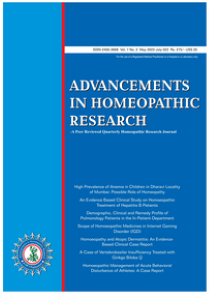The Global Dominance of English Language in Homeopathic Research: A Double-Edged Sword
DOI:
https://doi.org/10.48165/ahr.2025.10.2.8Keywords:
English Language, Global Dominance, Homeopathic ResearchAbstract
The English language has many positive aspects, such as its wide acceptance, its reputation as an academic language, and the ability to offer a broad array of literature in digital and print formats. Overall, like many other disciplines, there are various advantages to the widespread use of English in global collaboration and research dissemination in homeopathy as it enhances the reach and credibility of the discipline and equality. The English language's wide adoption contributes to offering a global forum for the exchange of innovative concepts and scientific discoveries, which can promote a more diverse and robust international research environment in Homoeopathy. Conversely, it is imperative to acknowledge and tackle the constraints, difficulties, and possible prejudices that come with using of the English language. The predominance of English may suggest that studies conducted in countries where the language is not spoken have been overlooked, which could result in a bias and a gap in scientific understanding.
References
Hayati, N. (2015, December 10). A study of English language learning beliefs, strategies, and English academic achievement of the ESP students of STIENAS Samarinda. Dinamika Ilmu, 15(2), 297. https://doi.org/10.21093/di.v15i2.211
Made, V. Y., et al. (2022, March). Exploring students’ and teachers’ anxiety in learning English during emergency remote teaching in vocational high school in Bangli. EDUVELOP, 5(2), 126–138. https://doi.org/10.31605/eduvelop.v5i2.1493
Sifakis, N. (2007, November). The education of teachers of English as a lingua franca: A transformative perspective. International Journal of Applied Linguistics, 17(3), 355–375. https://doi.org/10.1111/j.1473-4192.2007.00174.x
Schneider, E. W. (2012, January 22). Exploring the interface between world Englishes and second language acquisition – and implications for English as a lingua franca. Journal of English as a Lingua Franca, 1(1). https://doi.org/10.1515/jelf-2012-0004
Dillon, J., & Griffin, B. (2003, April 2). Playing the past: Approaches to English historical drama 1385–1600. The Modern Language Review, 98(2), 429. https://doi.org/10.2307/3737831
Kinginger, C. (2008, November 27). Language learning in study abroad: Case studies of Americans in France. The Modern Language Journal, 92, 1–124. https://doi.org/10.1111/j.1540-4781.2008.00821.x
Kruk, M. (2017, October 23). A look at advanced learners’ use of mobile devices for English language study: Insights from interview data. The EuroCALL Review, 25(2), 18. https://doi.org/10.4995/eurocall.2017.7461
Jenkins, J. (2015, August 14). Repositioning English and multilingualism in English as a lingua franca. Englishes in Practice, 2(3), 49–85. https://doi.org/10.1515/eip-2015-0003
Jenkins, J. (2006, March 1). Current perspectives on teaching world Englishes and English as a lingua franca. TESOL Quarterly, 40(1), 157–181. https://doi.org/10.2307/40264515




